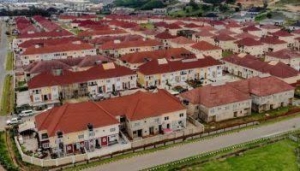Super User
National housing programme: Over 7,000 applications received in a week, says Fashola
Babatunde Fashola, minister of work and housing, says over 7,000 applications have been received for the national housing programme.
The federal government had, on November 12, launched a portal for persons interested in the homes to apply.
According to a statement issued on Friday by Boade Akinola of the ministry of works and housing, Fashola, who spoke while appearing before the senate committee on housing, said more applications are expected.
“As at today, 7,315 applications have been received so far and the number is still growing,” the minister was quoted as saying.
“There are 1, 2, 3 bedrooms, some of which are bungalows while others are flats. The minimum house is N7.2 million and the highest is about N16 million.”
Explaining why the ministry decided on online applications, Fashola said it is in line with current realities of digitisation.
“Our thinking is based on experience and what we think is right. This is a digital age. If we buy air ticket and book hotels through the internet, we believe we could do the same in applying for the houses,” he said.
While noting that applicants are expected to buy one house, he added that the variation in prices according to states is as a result of the cost of building and topography.
“Affordability is not just a function of the cost but also the mode of payment, that is why we have created the rent to own option of payment,” he added.
The Cable
Real Estate is way behind in tech. Here's why and how to fix it
How can industry professionals embrace today's digital tools to better serve their clients?
Real estate has given millions of people incalculable opportunities, from realtors who get to make a great income by helping people find their dream homes, to investors who revitalize run-down neighborhoods and create new housing. But despite all that, there are some flaws. There's one in particular that affects real estate professionals the most, trickling down to everyone else who touches the industry in any way. Namely, the industry is way behind when it comes to technology, and this has a dramatic negative impact on efficiency and profitability.
If you’re in the business, you understand the significance of this shortcoming. Not only does it impact your revenue, but it also leads to more work, higher costs and increased burnout. But when you leverage technology for increased efficiency and profitability, that means you can pay your team more, offer better benefits and a more enjoyable workplace, and serve more clients.
The first step is to identify where your bottlenecks are. For many, that's in following up with prospects and clients. This is a relatively easy fix now that there are countless Customer Relationship Management (CRM) tools available, including many designed specifically for the real estate industry.
Every large franchise provides some type of CRM, but today, anyone all the way down to solo realtors just starting out can afford one. The key is to actually use it.
Most people simply enter names into the system and never do anything else until they find themselves in a slump and have to drum up business in a hurry. That doesn’t work. The whole point of a CRM system is to build and nurture relationships with prospects and clients. So you’ll have to keep detailed notes on these people and communicate with them regularly. Some of this communication can even be automated with drip campaigns, but just be careful not to overdo the automation.
Remember, if you make people feel like a number, they won’t be receptive. Just think of how you feel when you receive those automated, tone-deaf emails or DMs on social media. Fortunately, modern tech can go far beyond nurturing relationships or finding deals; what used to take a team of highly paid analysts can now be done with AI and big data.
Now, you may be thinking, “That’s crazy. There’s no way a computer can match my team’s knowledge and experience.” But here’s the thing: AI is already powering significant parts of your life and you probably don’t even realize it. The targeting for the Facebook ads you use to market your business is powered by AI. The GPS that routes you around congested traffic on your way to your next showing is powered by AI. And even Zillow, the real estate platform so many Realtors love to hate, is powered by AI.
When you conduct a Zillow search, you can select multiple criteria, but what most people don’t realize is that behind the scenes, AI is going outside of that criteria to find homes that you might be interested in based on a complex algorithm that analyzes human behavior. In essence, they’re using AI to give users exactly what they want. Not just based on their search parameters, not just what they say they want, but what they actually want.
AI is also used in evaluating potential development opportunities because it enables developers to analyze a mind-blowing amount of data and make accurate predictions from that data. This reduces risk and helps developers move more quickly with their projects.
While the real estate industry is way behind when it comes to technology, we can change that. Every day, new innovations are getting cheaper and easier to implement. And if we want to remain competitive in the coming years, we absolutely have to. Otherwise, we will lose ground to those who leverage it properly.
Entrepreneur
Nigeria @ 61: Experts blame leadership failure for housing crisis - Dayo Ayeyemi
Nigeria has the potential to house all its citizens at 61, going by the presence of abundant natural and human resources, but due to failure of leadership, many of the citizens are without a roof over their heads, while some others live in slums and unhealthy environments.
Speaking to Nigerian Tribune when interviewed at the weekend, most of the built environment experts chorused leadership failure as a major factor responsible for the nation’s housing and infrastructure woes since independence.
According to the United Nations’ (UN) estimates, Nigeria has over 17 million housing deficit, and would require over N59.5 trillion to bridge the gap at N3.5 million per housing unit.
Taking a critical look at the Nigerian housing sector, former President of the Nigerian Institute of Building, Chucks Omeife, stated that lack of genuine commitment by various governments to well articulate housing policies has become the problem of housing in Nigeria in the last 61 years.
“Government has continued to pay lip service to the provision of housing for the people,” he said.
According to him, there has never been a lack of virile and robust housing development policies in Nigeria, adding that the problem had been lack of sincerity on the part of the government to carry out the provisions of these policies to impact on the sector.
Omeife added: “Government has failed to understand that activities in the housing sector can go a long way in reducing poverty, create employment, impact on the standard of living, encourage skill acquisition and ameliorate the present hunger in the land.
Red tape
America-based housing finance expert, Kunle Faleti, a Nigerian, identified failure of the government to create the enabling environment that will ensure full public sector participation in affordable housing delivery as a major challenge.
According to him, there were different initiatives set up but lacked the required collaboration, adding that the informal sector, where most low income earners belong, was also neglected.
“Most policies focus on white collar, blue collar and people in diaspora,” he said.
He added that lack of will on the part of policy makers and regulators was also a challenge, noting that there was a big knowledge gap and lack of required skills set on the part of mortgage bank employees.
“Round pegs are being put out in square holes to implement policies,” he said.
According to Faleti, the nation’s mortgage system was unable to deliver due to an obsolete business model, noting that “FMBN’s role 45 years ago is still being put in practice.
“It cannot work. Banks do not have the long term capital for obligations such as 25 year mortgages. Risk assessment modules are non-existent. Credit bureaus are not fully leveraged. As a system we are not pro-active, we only react,” Faleti said
Chairman, HOB Estates Limited, Chief Olusegun Bamgbade, aligned his assessment of the nation at 61 with the general view of the populace, blaming failure of government for lack of affordable housing delivery and economic growth.
He pointed out that the state of housing and major infrastructure in the last 61 years was appalling and nothing to write home about.
“The founding fathers of the nation were positively competitive with regards to regional developments. However, every housing and infrastructural development achieved before the first military incursion into power was wiped off with the advent of the unitary system of government.
Positive regional competition died a natural death especially in housing and other infrastructural developments.”
According to him, the leadership failed to utilise the functionality of the Federal Mortgage Bank of Nigeria to better the lives of the citizens on housing.
He emphasised that the leadership failed to regard housing as an essential part of good governance, pointing out that without infrastructure and good housing provisions, there won’t be governance.
“Everyone must have a shelter. Everyone must enjoy a taste of good governance via infrastructure. The leadership failed to realise that absence of good shelter will affect per capita products in the country. When you don’t have a good roof over your head, you can’t have a good rest. When you failed to rest well, you can’t be efficient at work thereby reducing the per capita products.”
Apart from leadership failure, Bamgbade explained that major challenges confronting housing and other infrastructural developments in the country were hydra-headed, multifaceted and numerous. He identified corruption, nepotism, partisanship, political foolishness and other vices as some of the challenges.
“Some would say it’s lack of funds, but an intelligent mind knows that funds are not the issue but the foolishness of the leadership on salient matters affecting the citizens. Where there is a will, there is a way,” the chairman of HOB Estate said.
Former President of the Nigerian Institute of Town Planners (NITP),
Stephen Onu said there was nothing to assess as Nigeria marks 61st Independence anniversary.
According to him, leadership had not shown any sense of direction to enhance homeownership among the citizens, especially those in need scattered around the landscape.
He said: “Have we planned new settlements in our urban and rural areas in a safe environment away from exposure to disasters?”
He identified inability to translate policies into workable programs for project implementation as a major challenge in the country
Besides, he pointed out that the mortgage system was crawling because of insincerity in its management.
“Why is FMBN not an apex mortgage institution? Why should it be competing with other secondary mortgage institutions on mortgage issues?” Onu asked.
Way out
Bamgbade urged leaders in government to put up good thinking caps and pilot the affairs of the nation right, saying time waits for no one.
“There’s need for improvement, there is need for seriousness, there is need for honesty of purpose, and there is need for patriotism among the elites and leaders of the country.
If the leaders can jettison nepotism and be fair to all, Nigeria can become great in all spheres,” he said
Faleti said “It is in the national interest of the developed economies to work out a strategic response to the problems and opportunities associated with urbanisation in the developed and developing world. If they ignore these problems, it is at our own risk. If they address them, economic and social development will expand, business opportunities will grow, state and local governance will be stabilized, and the need for crisis intervention will decrease.”
Nigerian Tribune
Nigeria’s housing crisis: Fact and fallacy - Yacoob Abiodun
The arresting headline in the June 3, 2016 edition of EnviroNews titled “Housing crisis looms with 17 million deficit,” must have scared the hell out of readers, nay other compatriots at this time when Nigeria is fighting so many wars both declared or undeclared. From Boko Haram to the Niger Delta Avengers coupled with the problems of corruption, kidnapping, economic recession, epileptic power supply and looted treasury.
The housing deficit figure was revealed at the 35th Annual General Meeting and International Symposium of Shelter Afrique held at the Transcorp Hilton Hotel, Abuja on June 1, 2016. It was contained in the opening address of President Muhammadu Buhari at the event, who innocently might not know the source of the figure he presented to the attendees of the Symposium. The President was just doing an obligated state duty, which protocol demands during such international event. This piece will focus on the fact and fallacy of Nigeria’s housing crisis.
Necessity for reliable housing data
As alarming as the figure of 17 million housing deficit is, one may be tempted to ask: From what source it is? How was the figure arrived at? Was any research done? Who or which institution spearheaded the study? I am asking these relevant questions as a result of my personal experience. This writer was a modest key player in the generation and dissemination housing data and ancillary information in Nigeria by virtue of my position as the pioneer Secretary of the Housing Policy Council (HPC), which was established in 1991 as a “specific-purpose” Council in the defunct Federal Ministry of Works and Housing. The HPC was a product of part of the recommendations contained in the operative 1991National Housing Policy. That policy recommended that HPC as a Council, be established for the purpose of monitoring and evaluation of housing policy implementation; and to give an annual report of its stewardship to the National Council on Housing – an apex body made up of all the Commissioners of Housing in all the 36 states of the Federation and the Federal Capital Territory (FCT). The body meets annually to brainstorm on housing, land and urban development in Nigeria and makes policy recommendation to the Federal Government for its consideration.
Part of HPC mandate was to establish a National Housing Data Bank for the country. As important as this assignment is in terms of generating data on housing through a detailed census that would reveal the quality and quantity, occupancy ratio and other pertinent variables for the housing census in Nigeria, the response the HPC got from majority of the states was poor and discouraging. Only very few states provided skeletal information while others simply did not respond to the questionnaires sent to them. Most of the states were either uncooperative or were naïve of how to provide the information/data asked for. When most micro institutions at the state level cannot provide housing data as input to the proposed National Housing Data Bank, it hampers the effort of the HPC to generate accurate and quality data on housing, which can be used for planning purpose and reliable statistics that agencies of government can co-use where applicable. The statistical figures being bandied around as housing deficit are figures that could not be supported with verifiable data.
The 17 million housing deficit that was referenced is suspect. The housing requirement in Lagos as a mega city of over 20 million is quite enormous if the high rate of housing demand is considered. Out of the figure of 17 million housing deficit in the country, Lagos alone can comfortably consume one third (5.6million) leaving a balance of 11.5 million. The residue figure of 11.5 million is what big cities such as Ibadan, Kano, Port Harcourt, Enugu, Aba, Onitsha, Kaduna, Owerri, Warri and Abuja can share because these cities are growing exponentially in population and so is the demand for housing in them. Basically, what this analysis reveals is that the 17 million housing deficit being bandied is what could only satisfy the needs of 10 densely populated urban centres in the country. In this calculus, the housing deficits in other state capitals are not captured. Ditto other secondary towns where there are equally housing shortages! The flaw in the given figure of 17 million housing deficit in Nigeria is discernable as analysed herein. Actually, Nigeria’s housing deficit is far in excess of the figure stated.
Underfunding of Research Institutions
It is a pity that the government that wants to improve the country’s housing situation, most especially for the low-income people, is not ready to fund most of the institutions responsible for research and data collection for planning purpose. The Nigerian Institute of Social and Economic Research (NISER) staffed by very brilliant Researchers has been left comatose and inactive due to acute underfunding. The Institute was on course when it started to collect data on “housing starts” circa 1990s as part of the foundation to creating reliable statistics on the number of houses built yearly in the country. The laudable effort by NISER was short-lived because the capital-intensive project was starved of funds and the idea was abruptly abandoned in less than three years, good as the initiative was. Many of the Researchers became frustrated and in wont of greener pastures abroad, many left the country.
The case is not different from what obtains at the Nigerian Building and Roads Research Institute (NBRRI), which exists in name now due to redundancy in building materials research attenuated by low operational budget. The Housing Policy Council was deliberately killed by the very mother (figuratively speaking) that midwifes its birth. As I write, the Federal Ministry of Lands, Housing and Urban Development has not thought it wise to re-establish the HPC despite its necessity and in line with the provision of the extant National Housing Policy, which recommends the resuscitation of the Council. In essence, government shares a chunk of the blame for not financially supportive of the Institutions it created, in order to enhance effective job performance of these institutions. Without reliable data, it is near impossible to determine the country’s housing requirement and how to develop a Housing Plan to meet such need.
Policy somersault
The rate at which Housing Policy is changed from one administration to the other in Nigeria is a counter-productive. From 1981-2014, a period of 33 years, the country had 5 different National Housing Policy documents, which on the average translates to one policy every six years! The ideal timeframe for housing policy review should be every 10 years when it could be reasonably determined the impact of such policy. But that is not the case in this instance.
Once a new administration comes into office and a new Federal Minister of Housing is appointed, his/her preoccupation is to formulate a new Housing Policy for the country, regardless of the merit of an existing policy he/she met in office. Often misguided by self-interest ministry officials, the Minister will be ill-advised to set up a Committee to formulate a new Housing Policy, which in the end would produce copycat (evidently plagiarised) of the old one. Such document is like identical twins born from one fertilised egg. The same strategies would be recommended for housing finance, land management, institutional framework, production of local building materials, low-income housing, public-private partnership etc. In addition to this, every minister wants to initiate a National Housing Programme, which entails the involvement of government in direct construction of housing contrary to the provision of the housing policy that stipulates non-involvement of government in direct housing construction.
Without any measure of proper policy evaluation to determine how effective its implementation in all the areas of housing components (land, finance, building materials, institutional framework, research etc), it will just be a wild goose chase trying to solve the nation’s housing problems as daunting as they are. It is not the frequency of policy change that would cause increase in housing supply in the country, but sincere implementation of whatever strategies the policy recommends regardless of whether such policy is old or new. This is an honest advice any Minister of Housing should take to heart. There is nothing wrong in pursuing the housing policy objectives of your predecessor in office using the subsisting policy as a guide. But where it is necessary, the policy’s grey area can be fine-tuned without reinventing the wheel.
Conclusion
Nigeria has a daunting housing deficit, the accurate figure of which is yet to be properly and scientifically determined. The current figure given is just a tip of the iceberg as alarming as it is. Until government changes its fire brigade approach to closing the gap between housing supply and demand, it cannot make the desirable impact in the sector. The change must start from the quality and honesty of advice government officials give to the administration. This leads me to the wrong step taken in the past of not allowing National Housing Policy to endure for a reasonable timeframe before it is prematurely reviewed and a new one is formulated. Any subsisting housing policy of government has what it takes to ameliorating the country’s housing crisis, but lack of continuity and faith or rather a deliberate attitude not to implement what the policy recommends, has been the bane of Nigeria’s housing crisis. Such negative attitude must change in this era of change.
* Yacoob Abiodun (Urban planner, planning advocate and pioneer Secretary, Federal Housing Policy Council)




